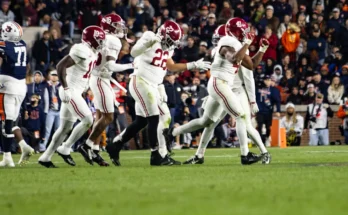Following the Anaheim Ducks’ victory, fans chastise the Edmonton Oilers for their silence and the referee issue.
The Edmonton Oilers, one of the NHL’s most storied franchises, had a season that promised to break through the long-standing barriers preventing them from capturing the Stanley Cup. Yet, following a highly publicized defeat to the Anaheim Ducks, their handling of the aftermath raised more questions than answers. Fans, players, and analysts alike were quick to voice their displeasure—not just with the loss itself, but with what was perceived as the Oilers’ inability to address key issues head-on, most notably the controversial referee calls that seemed to influence the game’s outcome.
In this article, we delve deep into the aftermath of the Oilers’ loss to the Ducks, exploring the silence from the team, the referee controversy, and how both have impacted the team’s reputation and their fan base.
The Defeat: A Bitter Pill for the Oilers
The Oilers entered their matchup with the Anaheim Ducks with high hopes. Armed with the dynamic duo of Connor McDavid and Leon Draisaitl, the Oilers seemed poised to extend their playoff run, adding another chapter to what was already a thrilling season. However, the Ducks, led by their young stars and strong defensive play, stunned the Oilers, outplaying them in almost every aspect of the game.
The game wasn’t just a loss on the scoreboard—it was an emotional blow to a fan base that had been waiting for years to see their team break through. Despite the star power on their roster, the Oilers seemed flat, unable to break through the Ducks’ defensive schemes and goaltending. With the Ducks emerging victorious, the Oilers’ postseason hopes took a hit, and the team was left reeling, both mentally and emotionally.
The Silence That Followed
In the immediate aftermath of the game, something unusual occurred: silence. The Oilers’ players, typically vocal about their performances, whether in victory or defeat, failed to provide the usual post-game analysis or emotional reactions. There were no impassioned speeches about redemption, no declarations of frustration about missed opportunities, and—most notably—no acknowledgment of the controversial calls that many believed directly contributed to the loss.
The absence of strong public responses left fans feeling abandoned. In a sport that thrives on the deep connection between fans and players, this silence was seen as a failure to connect with their loyal supporters. Edmonton’s fan base, already passionate and deeply invested in the team’s success, expressed their frustration through social media, fan forums, and call-in radio shows. The Oilers’ apparent unwillingness to engage with the defeat—whether through apologies, explanations, or candid reflections—did little to calm the growing discontent.
While some players likely needed time to process the loss, the public silence from the locker room, including from key figures like McDavid and Draisaitl, only deepened the sense of frustration among fans. In contrast, the Ducks had already begun to celebrate their victory with a press conference that acknowledged both the highs and lows of the game. Their captain, John Gibson, spoke at length about the emotional rollercoaster of the series and the team’s resolve to push forward, fostering a sense of transparency and accountability that the Oilers seemingly lacked.
The Referee Controversy: A Cloud Over the Game
While the Oilers’ silence was one issue, the referee controversy that emerged during the game cast a long shadow over the defeat. From questionable penalty calls to missed infractions, fans and analysts alike were quick to point out that the officiating in this game seemed to tilt the balance in favor of the Ducks.
A particularly contentious moment came in the third period when a critical penalty call against the Oilers’ defenseman resulted in a power play that the Ducks capitalized on. Television replays showed minimal contact, leading many to question the integrity of the call. Oilers fans were quick to point out that this decision, coming at a pivotal moment in the game, had the potential to swing momentum in the Ducks’ favor.
In the aftermath of the game, NHL refereeing standards came under scrutiny, and the Oilers’ fan base exploded with outrage over what they saw as a blatant injustice. The Oilers had always prided themselves on playing an honest, hard-hitting game, and for many fans, the idea that a game could be decided by what they considered a bad call felt like a bitter betrayal.
Despite the growing chorus of complaints, the Oilers remained largely silent on the matter. The team failed to publicly challenge the calls or even acknowledge the controversy. This silence was interpreted as a lack of leadership, with many fans feeling that the Oilers’ management and coaching staff were too passive in defending the team’s honor and addressing what they saw as an unfair disadvantage.
Fans Express Their Frustration
The reaction from Oilers fans was swift and furious. Social media platforms were flooded with posts demanding accountability, with many accusing the team of being “soft” in the face of adversity. Fans took to Twitter, Facebook, and various fan forums to voice their discontent, sharing their opinions on the poor officiating and the team’s failure to stand up for themselves.
One of the key criticisms was the idea that the Oilers, as a team with championship aspirations, should not rely on referees to dictate the outcome of a game. However, the lack of public commentary on the referee controversy made many feel that the Oilers were not taking ownership of their failures, whether they were on the ice or in the hands of the officials.
This frustration reached a boiling point when certain high-profile fans and former players began to weigh in on the situation. In an interview with a local Edmonton sports radio station, former Oilers defenseman Chris Pronger spoke candidly about the importance of standing up to both opponents and officials. Pronger, who had been known for his tough, no-nonsense approach to the game, suggested that the Oilers’ lack of a vocal response to the controversial calls reflected a deeper issue within the team’s culture.
“Referees will make mistakes,” Pronger said, “but it’s the team’s responsibility to make sure they don’t let those mistakes define the game. You need leadership on the ice and in the locker room. That’s what the Oilers need to figure out.”
A Deeper Look at the Oilers’ Leadership
While fans were upset with the Oilers’ silence following the Ducks’ victory, this moment also exposed deeper issues regarding the team’s leadership. The Oilers had long been heralded for their star power in McDavid and Draisaitl, but the question lingered: were they equipped to handle adversity both on and off the ice?
In interviews, analysts pointed out that the Oilers’ lack of leadership in this situation revealed a gap in the team’s ability to deal with setbacks. McDavid, known for his incredible skill, was often criticized for his inability to step up in high-pressure moments. Draisaitl, despite being one of the best players in the league, seemed to fade when the spotlight was brightest.
The absence of veteran voices, ones who could have rallied the team and taken the officiating issue head-on, further highlighted this leadership vacuum. The Oilers lacked a clear spokesperson who could balance diplomacy with accountability, someone who could address the controversy without throwing the referees or the league under the bus. This gap in leadership was particularly glaring after the Ducks’ victory, as the Oilers had no one to step forward and challenge the narrative that was emerging.
Looking Ahead: Can the Oilers Recover?
The Oilers’ defeat to the Ducks may have been a wake-up call, but the way they responded—or, more accurately, failed to respond—raises questions about the team’s resilience moving forward. A season of great expectations could now spiral into yet another instance of unrealized potential.
For the Oilers to move forward, they need to adopt a more aggressive stance both on and off the ice. This means not only addressing the obvious on-ice issues but also fostering a culture where leadership thrives in every situation—especially after a loss. The lack of response to the referee controversy is just the tip of the iceberg.
As the season continues, the Oilers will need to find their voice—whether it’s through stronger play on the ice or a more vocal stance off it. They must prove to their fans and to themselves that they are capable of overcoming adversity, not just with skill, but with the leadership and emotional resilience required to handle any setback, be it from the opposing team or the referees.
In the end, the defeat to the Ducks was more than just a loss; it was a moment that exposed the cracks in the Oilers’ foundation. Whether they can rebuild and prove their worth remains to be seen—but the fans’ calls for accountability and a response to the refereeing controversy are likely to echo until that happens.



